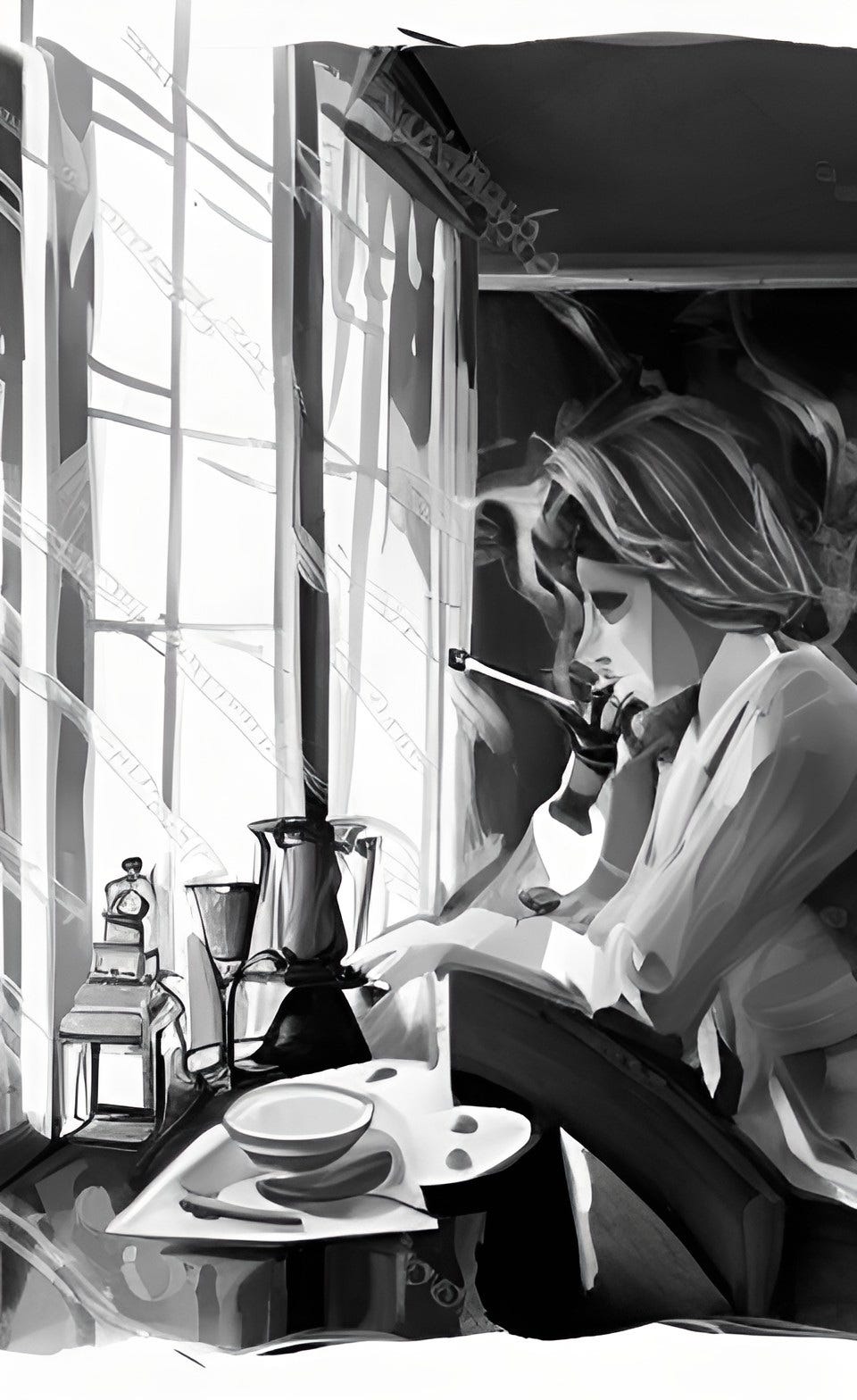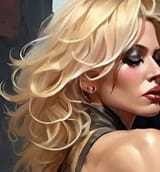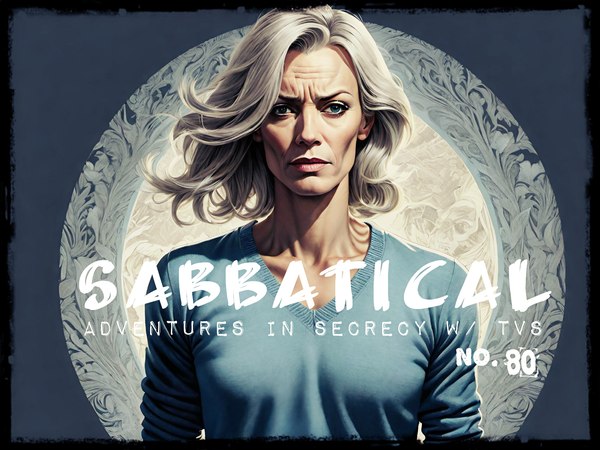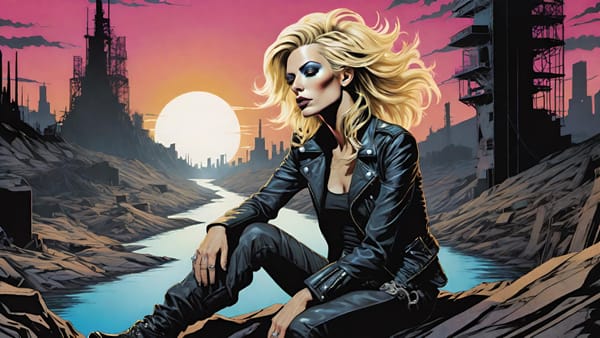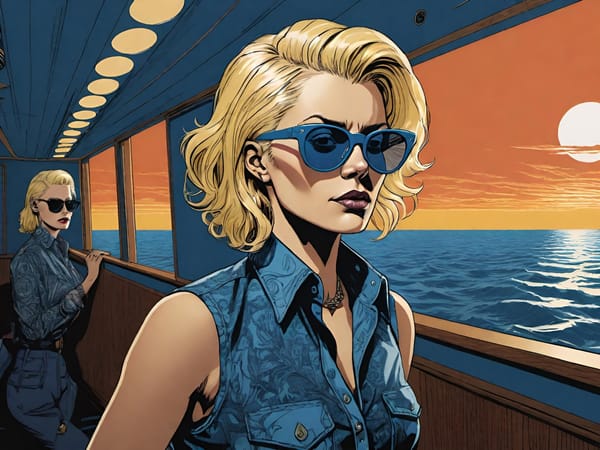Would You Spot Me?
Day 5
You bitch and moan about how there’s paid content now, and how I lowkey promised I would never do that. Unless you don’t, in which case, you’re a babe.
But assuming you do, then don’t lose your balls over it, okay? I’ll put it on Ello eventually for free.
But I add, It’s like, not that much money. Like, if we were out to lunch or whatever and I forgot my card, are you saying you wouldn’t spot me?
You say something smart like, Not every month I wouldn’t.
And I’m all like, Look bitch, it’s not my fault Substack won’t let me set up a one time payment or a one month sub or whatever. Complain to them. Also, you can just, like, cancel it or whatever. And there is a free seven day and all that shit.
You say, But I always forget to do that for like six months.
I’m like, That’s still the price of a nice dinner, babe. Or less.
You shrug, and we carry on.
I tell you this story. It’s from SOMA, yeah, I know, so it’s not all-new ‘tent, but imma give you more, too, okay? So chill.
I say it’s about this dipshit critic named Zadok Spitz.
You’re all like, Who’s Zadok Spitz?
I squeeze your arm and look at you with a sweet but slightly annoyed smile and say, I’m trying to tell you, babe.
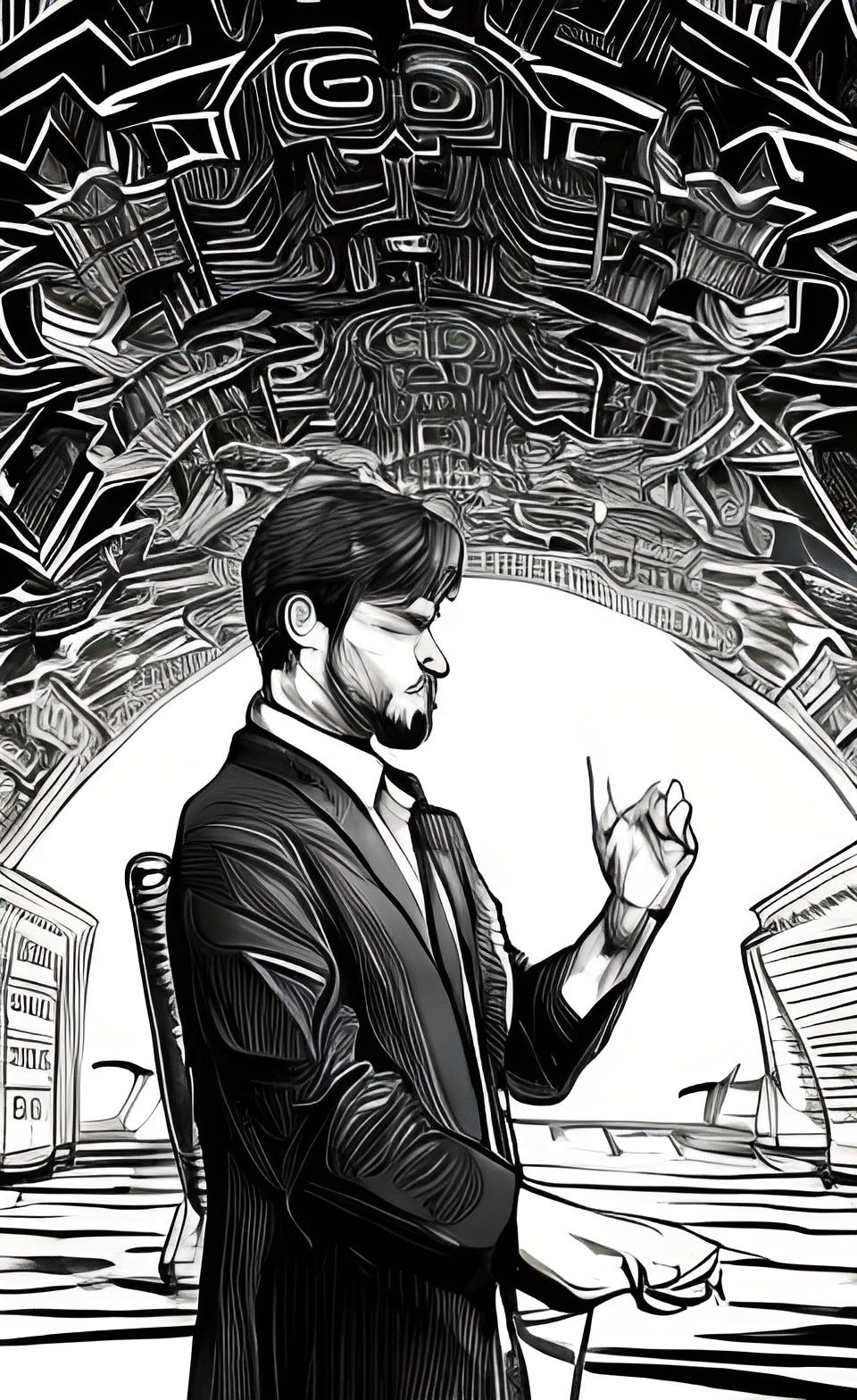
Zadok Spitz has an MFA in creative writing. He also has a master’s degree in education. When he was young, he enjoyed make believing the same things as other peers his age, but he preferred to play the mentor characters rather than the heroes.
Zadok hasn’t been particularly lucky in love. He didn’t date much in high school—in part because most girls read him as gay, when in fact, he was not—and in college, he spent most of his time reading and hosting a late-night college beam show. He chose to wear a boutonnière to class on the reg. Sweaters and loafers, pressed jeans. His hybrid course avatar was cravate noire. He connected better with his professors than his peers, and his only relationship was with a teaching assistant named Grabney Carver.
Grabney was pretty and brilliant, with black-framed glasses before they were the fash, and a tight, erudite smile. She was a Proust admirer, and did her dissertation on the work of Nabokov.
They’re both tall. Zadok at six feet two, Grabney at five eleven in flats. His senior year, they were something of an English department power couple, hosting chill candlelit book parties and wine tastings. They smoked expensive cigars and made out with colleagues in the kitchen, while the other espoused the latest assault on antideconstructionism in the living room to a captive, chuckling crowd of undergraduates. They made love somewhat frequently, usually with her tying him to the bed and having anal sex with him, followed by him shoving various fruits and vegetables into her mouth, vagina, and anus until she climaxed.
They have no friends of color, and are politically very liberal, though both went on to vote for Roland Flush.
In the September following his graduation and her appointment to a small liberal arts school, they married. The ceremony was relatively small: their family, friends, and one attendant each, plus the officiant, a priest of Jupiter. They kissed after their vows, but it was a church kiss, tight in the lips.
They stopped having sex after that, and both began to masturbate compulsively, often in inappropriate places.
Grabney particularly liked self-pleasuring at work, in her office, often fantasizing about being the centerpiece of a delicious meal on a long table, all the preeminent writers of her time in attendance, each one savoring the cuisine and patiently awaiting their turn to share the food with her, to put it in her, to eat it from her.
Zadok preferred his home office study where he had easy access to pornography and sex toys. He would, on occasion, masturbate in his car, too, and kept the necessary accoutrement for cleanup in his glove box and console, separated to deflect suspicion. He occasionally employed sex workers to give him anal sex or let him perform oral sex on them, sometimes whilst feeding them peanut butter or bananas or grapes.
In the winter of five years’ time, they divorced. Grabney married a tenured professor of Aemerice literature who went on to become provost; and she, dean of students. They had no children.
Zadok was single for several years before marrying a much younger woman. Despite his education, he chose not to pursue an academic career, instead working for various private beams, first as a food critic, then as a book reviewer.
Which, of course, is how I met him.
He sounds like a d-bag, you say.
Totally, I say. But wait. It gets worse.
We’re eating at the Soma Café. He adjusts his expensive-ass glasses, straightens his herringbone blazer over his crisp white shirt, no tie, just a bit of manicured chest hair pluming. “Wouldn’t you say it’s self-indulgent? Your work?”
I sigh, tap my cigarette in the ashtray. “Yes, I suppose.”
“Your novels, if they can fairly be called novels, lack cohesion, structure, plot. There are dead-ends and false starts. More characters than I can count.”
I smoke, then go, “Some of that is true. There are a few hundred characters in each book, most of them named, and often times there is a main theme but not necessarily a main storyline. But I don’t think you can say they lack structure. I structure the fuck outta these things.”
“No discernable structure, then,” he amends, makes a holonote, then sips his Darjeeling.
My eyes tighten through the smoke. I take a sip of coffee, then say, “As you like.”
“Then there’s the graphic violence and sexuality. Do we not live in a post violence world?”
“Do we?” I ask, sincerely.
He ignores me, goes, “And the sexuality is so cis het and vanilla.”
I arch an eye, go, “Did you actually read the books?”
“Oh sure, you transpose the gender presentations and identities of your characters and contrive situations in which they can feel a bit kinky and transgressive, often seasoning these haberdasheries with pointed emotional bile and physical pain, co-experienced by the characters as pleasurable and repugnant.”
My eyes narrow, and I take a drag, say, “That’s a mixed metaphor.”
“Pardon me?”
“Seasoning and haberdasheries.”
He blinks, then bats away the smoke, sips his tea, refers to his holo. “Oh, and the presence of women is virtually none.”
I shake my head. “How do you figure that?”
“Irrespective of the gender of these characters—reflexive, prescribed, or implied—these are not feminine creatures.”
“Oh?”
“No. They are men in various states of dress, intersexed in fashion and speech, but lacking any of the quintessential qualities of womanhood.”
“So you’re saying there are quintessential qualities of womanhood?”
“Well, yes.”
“And what would those be?”
“Gentleness. Empathy. Sensitivity. Caregiving. Compassion. Charm. Altruism. Nurturance.”
I tap my cigarette, smirk, take a pull. “It’s interesting to me that you have this list and are judging my books by it.”
“I’m a critic.”
“Indeed you are.”
He blinks again, almost as though I’ve farted, then says, “In These Are the Things I Know, you introduce a magical negro.”
“Did I?”
“Well, yes.”
“You sure of that?”
“Again, whether the racial identity of the Lady Brujo is given or not, he is clearly meant to be a person of color, clearly infused with Afro-Caribbean magic, and again we see casual kink infused into situation where they would either not occur or would be viewed as abusive.”
“Well, maybe if you met Bru you’d change your mind,” I said.
His eyes light up. “So, you admit these characters are real? They are not fictional?”
Fuck. “I didn’t say that. I said, if you met Bru, you might change your mind.”
“That implies he is real.”
“No, you inferred that. What I meant was if you could meet Bru, then you might change your mind.”
“If he is indeed a fictional character, then he is not immunized from literary examination, and I stand by my critique.”
I shrug. “Okay. Whatever. Fine.” Then I add, “But I don’t agree.”
“You seem possessed by genre, like an inhabiting spirit or a too rich brine that suffuses potential literate ideas and cogent situations with a sophomoric heaviness, a candied glaze ruining a serviceable piece of meat.”
“Are you, like, writing a review right now? Or do you really talk like this?”
“This is how I speak, yes.”
“Okay. Just checking.”
“You also employ the unsightly use of personal exposition and rumination in your prose. This makes a turgid and tiresome read, this insular vernacular spilled out like esoteric recipe, a cornucopia of self-indulgent, narcissistic ramblings, then not so cleverly concealed by lampshades, such as in the Q&A scenes.”
I point with my smoking hand, just a bit from my wrist, not like a full-arm point, go, “You used that word already.”
He ignores me. “And you insult your audience, which presumably at the time of composition was entirely imaginary.” Zadok stops, looks at me.
“Was that a question?”
He nods that it was.
“Sure. Yeah, I had basically no readership then. Not that I was aware of, anyway. It was out there on the beams, but I wasn’t getting a lot of interaction.”
“It’s clear in these scenes that you look down on the very people you imagine would be interested in your work, which was none—or none known to you, as you say. Further, you insult the conventions of genre writing while employing them.”
“You used that word earlier, too.”
“And you mock serious study of literature, deriding it as a self-indulgent waste of time and a cryptofascist club for the upwardly mobile.”
I blink, smile, go, “Well isn’t it?”
“You affirm that, then?”
I smoke, exhale. “Yeah. Sure. Why not.”
“You also hide your own privilege. You conceal your cis het identity within the framework of a queer character, replete with confirmation liaisons and blended imagery.”
My blood pressure went up. “Look, you can say what you want about my work, but now you’re talking about me. And you don’t know what the fuck you’re talking about.”
“Have you not benefitted from societal advantage, both in terms of positioning and opportunity?”
I sighed. “Yes. I have. Both.”
“Do you not currently?”
“Yes. I do.”
“In both ways?”
“Yes. Both.”
“Like your books, while you may state what you like, what you show is a world run by a narcissistic child, an unreliable narrator who hides his true identity behind thick eye makeup, snarking down from atop high heels, and dusted with powder and candied lips.”
I lean on my smoking hand, stare out the window.
“You hide in life as you do in your books, continuing to use masculine nomenclature and pronouns while demurring such use in your avatar’s sphere, employing instead the non-entity of ‘they,’ and appropriating Valleyspeak and Southern affectation for your semi-cryptic persona.”
I finish my smoke, stub it out, take a sip of coffee.
He looks at me, expectant.
I look at him.
“Do you confirm this?”
“I mean, some of that is true. Some of it is only incidentally true. Some of it is a gross simplification and misunderstanding of me and my problems.”
“Which is which?”
“Look, it’s not an easy thing to sort out. People think I’m brave, okay? They tell me that a lot. But I don’t feel brave. Not about this. I feel scared. Very scared. Every day. Well, almost every day. So I do the best I can with it. And you’re right about my advantages. I can hide easily. I try to address that, to own that, even if I mythologize it in the books.”
“You’re referring to ‘ghosting,’ your narrator’s racially conferred ability to move unseen.”
“Sure. I mean, I guess. I’ve tried to do it a few different ways. But what I’m getting at is that cowardice isn’t the same thing as malice. It’s not my desire to hurt anyone here or give anyone the wrong idea. I’m a fiction writer, not a politician or a religious leader. Whatever I do is in the purview of entertainment and art.”
“You do not assume any social responsibility as an artist, then?”
“I didn’t say that.”
“I inferred it from what you said.”
I smirk again. “Fair enough. I assume a moderate amount of social responsibility as an artist, a bit more as an entertainer. But I put my own humanity first.”
“Meaning?”
“Meaning people aren’t perfect. We do stupid things. In my case, it’s often an accident, but sometimes I get ideas in my head that seem okay at the time and as they play out, I see they really aren’t so hot.”
He blinks his holo forward a few blips, then says, “Your narrator has an exploitative relationship with almost everyone they know.”
“Well, yeah. I didn’t set out to write a likeable protagonist. I mean, I’d rather folks not utterly hate them, but that’s just my preference. People can feel however they want about it.”
The server brought us dessert.
He got a slice of huckleberry pie.
I got a chocolate mousse kina dealie.
We ate in relative silence, real silverware clinking against real china. He’s one of those folks that can crunch soft food somehow, and I’m one of those who smokes whilst they eat.
Together, we did what people do, in the Soma Café.
You say, What a dick.
I say, Hold your load for just one more second. We’re almost there.
So we finish eating, and the server brings us the check, and usually these kinds of fuckers pay for my meal. But he doesn’t offer to, so I look in my bag and see that I don’t have any way to pay.
“Would you spot me this time, Zads? I can get you back next time.”
He just smirks, stands up, and leaves.
What a dick, You say.
Thanks, babe, I say.
Play procedures:
- Write about your impressions of Zadok.
- Think about the criticisms he levels at my work. Do you agree? Do you disagree? For what reasons?
- Write down your experience of reading this and think about what you might want to do next in the story.
Part 1 of Day 5 of National Novel Writing Month 2022 and The Teresa Van Santāna Literary-Somatic Experience
